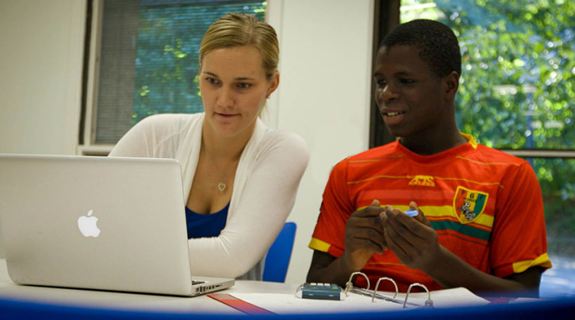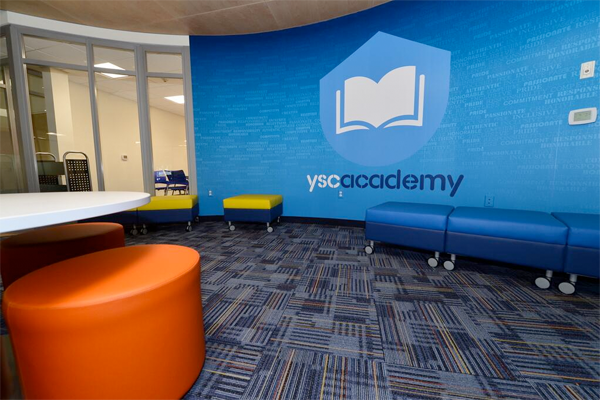Photo: Courtesy of YSC Academy
Last week, 2017 YSC Academy left back Matt Real signed a professional contract with Bethlehem Steel FC.
After the announcement, PSP asked Head of School Dr. Nooha Ahmed-Lee a question concerning the young man’s high school diploma, namely, was he going to finish it?
After speaking to Ahmed-Lee, it is gently apparent she thinks the wrong question was asked and the question should have been, “How well is Matt Real equipped to direct himself through the future life he has just shaped for himself by making this decision?” She of course is much too polite and polished to ever have said directly that we had erred.
Nevertheless, the answer to our question was a resounding “yes,” Real would finish his high school education and Ahmed-Lee explained he is extremely well equipped to direct himself through his future, whatever it may turn out to be. She has known Real since when they were both part of Shipley School in Bryn Mawr, and together they are founding members of YSC Academy, albeit in noticeably different roles.
But the two questions Dr. Ahmed-Lee really wanted to answer for PSP were how well every academy student is being equipped to direct themselves through their futures. For an elite few, those futures may include professional soccer. They may include NCAA Division 1 soccer on athletic scholarship for proportionally more, or they may include playing the game for less highly emphasized collegiate programs. She was emphatic that appropriate college is always an option.
Also, Ahmed-Lee wanted to make clear how well each and every single one of her academy boys is equipped to continue to learn whatever he needs to learn to achieve his goals for the rest of his life.
The environment’s necessary characteristics
A single core principle underlies the YSC Academy classroom approach: Meet the needs of each and every individual student.
In order to identify those needs, the school must know each individual student well. Discussions about students involve coaches and residence house parents as well as classroom teachers and school administrators.
To be able to know each student the school culture must enable vulnerability, and, to so enable, the culture must encompass trust, responsible self-restraint, and respect for others among all participants regardless of age.
Students themselves play large roles in creating the characteristics of this culture. Adults do model behaviors for them, but they model for, and to, each other much more. They illustrate the ancient East Asian educational principle that outward forms of behavior influence an individual’s inner character. By modeling trust, self-restraint, and respect, they begin to embed those very qualities in themselves.
And, consistently when describing her vision of her school’s culture, Ahmed-Lee uses the same term William Penn used when naming his city, love.
Now, the students at YSC are a select population. They are athletically “select” especially, academically “select” quite obviously, and their characters must display “select” levels of personal motivation. Like Real, all these boys are driving themselves to realize a specific dream by exploiting a rare opportunity. To that end they choose to sacrifice many customary facets of contemporary American teenage life. They practice a comment-worthy degree of self-discipline.
They sow very few wild oats because the consequences of so doing are obvious the next day on the practice pitch, in classroom recitation, and on Canvas, the learning management system to which everyone posts their homework.
Math help = better time management
Because of Canvas the boys have learned that advance preparation of their math homework with a math teacher or other interested adult takes less time than doing the work poorly, submitting it, and having to redo it while simultaneously doing the next assignment too.
PSP has seen directly both Math Department Chair Caroline Buchanan and fellow Math teacher Kelly Shank in the common spaces when the teachers have no classes sitting with individuals observing computer screens , working one-on-one with boys who may suspect their homework needs improving. And School Administrator Jackie Erixxon pitches in when possible if the details of keeping the school running allow. Shank stays two hours after practice ends at 6 pm for the express purpose of math help.

The goal
The extra math help vignette illustrates perfectly the hoped-for end result for each student: “self-responsibility,” being aware of one’s situation and responsibilities, deciding for oneself what is needed, and meeting the need successfully.
When PSP asked Lee to clarify “self-responsibility,” she used the new Bethlehem Steel signing as an example.
Matt Real will be able to continue to be responsible for himself after deciding to change the circumstances of his education by joining Bethlehem Steel FC. He will because he already knows how to be functional, flexible and self-reshaping in a new, different environment. He has the skills, the tenacity and the confidence to adapt appropriately to the future 24-7-365, whatever that future may be.
He already proved it when the Academy U-18 team travelled away during the academic year for week-long Development Academy tournaments. He proved it as well during trips and camps with the US U-18 MNT. Now he will have to sustain his self-responsibility continuously until early May as he finishes his high school diploma while also beginning his professional career.
He will get supporting help. And he is already well-oriented towards using it.
Is the task better suited for automation or dialogue?
YSC Academy offers a “blended” education, a term of art for which PSP sought explanation, both as to what it was and as to how it would help Real, now practicing with his team in Chester everyday at 11 am rather than listening to the day’s all-school presentation that takes place at the same time in the “gathering space” at the Academy in Wayne.
The “blend” is combined use of each of two different resources, teachers themselves and educational technology.
Computers and the internet retrieve, regurgitate and repeat simple factual data: “Where is Milwaukee?” “How do you calculate force?” “What is a base ten number system?” “Will you please drill me on the multiplication tables, my Spanish vocabulary list, and then the capitals of South America?”
Teachers dialogue complex explanations, tailoring them to fit a student’s particular strengths and weaknesses: “I agree, ‘amateur contract’ sounds like a contradiction in terms. Why do you think they use the phrase?” Or the favorite of math students everywhere. “Yes, dividing something by nothing should produce nonsense because it’s impossible. But, can you explain how Isaac Newtown recombined what he already knew in response to the nonsense?”
An additional “blend” in YSC Academy’s education combines the immediately “here” with the remotely “far.” Skype and Canvas mean a high school student with a MacBook Pro on a bus riding to a game in North Carolina can ask his geometry teacher to explain the Pythagorean Theorem in a different way after the first one didn’t work.
Last year the blend meant that when Auston Trusty missed a Wayne class practicing in Chester, he could later watch the class on videotape and then dialogue for his specific questions. He undoubtedly did more “self-teaching” than do most high school students.
But “self-teaching” is what Dr. Ahmed-Lee and her teachers ultimately want for all their students. We living humans currently exist in an age of rapidly accelerating change. The database and skills needed to cope with 2017 will be neither adequate nor appropriate to 2067.

Remote soccer practice is an opportunity to clinch a skill the Academy is already actively teaching. The faculty are experimenting with how better to provide remote support. Kelly Shank, for example, comes to YSC from four years at a cyber school where remote support was the only support. As more Steel boys follow the trail Trusty blazed, more support resources will find their way to the Power Training Complex’s Annex in Chester, to help Matt Real and others like him develop two different categories of skill sets simultaneously, soccer and academics.
Failure can be a good thing
Now, no one completely succeeds in being fully self-responsible, either immediately, or all of the time. Failure happens. But failure is allowed. Failure is not a cause for punishment or humiliation. Everyone at YSC experiences it, as does everyone in life. Think learning to walk.
Here it becomes an important component of learning. Part of the trust that exists in the YSC daily community is being allowed to fail.
No one monitors student use of free time, for example. There are no study halls. Students ask each other to keep noise down, or create self-isolation by donning headphones. Ahmed-Lee’s ‘not-an-office” is a corner of the library, a space that is designated not necessarily for actual “silence” but for focused “quiet” certainly.
Followers of the Philadelphia Union may remember Earnie Stewart described this offseason a difference between the 2016 team’s play in the spring and in the fall. In the fall, he said, the team played as though they were afraid to fail. The psychological resilience to learn from failure at a student’s desk transfers to the resilience to learn from it on the pitch.
Failure can be good if it is followed by correction, correction that does not humiliate, that does not close ears and minds. Correction presented properly can actually achieve improvement and by its own action put itself out of existence.
Part of correction is to watch oneself from a third-party perspective to determine one’s own workplace needs, identifying one’s own process of learning. That is not a finite task. It is an ongoing behavior, a process. To execute it the individual must be self-aware, self-confident and must accurately understand his surrounding circumstances. The Academy hopes the behavior turns out to be every graduate’s life skill. It is not learned without experiencing failure.
A final word
PSP readers and Union fans will remember Earnie Stewart and Jim Curtin describing Auston Trusty’s self-directedness, both at the time of his signing and subsequently. When Trusty is given a specific technical skill to improve, invariably he gets a ball after practice and seeks out more experienced, technically better teammates with whom to practice it. No words of suggestion have come from coaches or the sporting director. Trusty generates them for himself.
Dr. Ahmed Lee mentioned that Trusty has approached her for help and guidance enrolling in online courses at MLS’s university-level affiliate, the University of Southern New Hampshire, something that illustrates ongoing concern for her kids past the end of her official connection. It also suggests long-term planning by the young Union center back; “self-responsibility,” in other words. Trusty took his first steps learning future use of USNH last year while remotely fulfilling YSC’s classroom curriculum in a quiet space in the Annex in Chester.
As PSP has quoted Academy founder Richie Graham some weeks ago, for YSC Academy it is “actually irrelevant” whether a graduate ever plays soccer professionally. Proud as they are of those who do — Ahmed-Lee’s smile when discussing Real was truly ear-to-ear — YSC’s purpose is preparing their boys to maximize their lifelong contributions to society, whether that means scoring goals on the pitch or achieving them off it.


Awesome article and it’s really great that the Union are taking a holistic approach to the academy. Like the article mentions about Trusty, the fact that the academy teaches a certain way allows him to continue developing his soccer skills but also strive to continue his education. This is really encouraging to hear from all perspectives.
Wow, what an impressive set-up. Great article.
Tim,
I really appreciate your well_written articles on this and your intense follow-up.
While the methods are considered unorthodox to most people I have no doubt they are a fit for this type of student.
My critical eye however can’t get past the financial aspect.
In private and especially public schools budgets are always a concern…with public schools you have elected school boards to protect student interests from the effects of a bean counter eliminating vital programs like say science class based on financial statistics. A private school dependent on tuition and alumni endowment isn’t going to risk angering revenue source.
Here however on the surface without knowing more it appears the financial backer is a sports team and students merely a commodity to that team.
God forbid the union find themselves on the path of the cosmos or have a couple straight years of bad ticket sales….academy budget would be fair game would it not? What of the student athletes then if majority won’t end up as pro?
Is alternative really a european-south american style of payment for players reinforcing the student_children as commodity approach?
A. Based on murky details on transfer fees from these tax cases against neymar and messi it sounds like the process isn’t completely sound for even the best success stories.
B. Idea of trading and paying for 12_16 year olds leaves sour taste in my mouth and risks creating hundreds of throwaway freddy adus vs a pulisic or pugh or real or trusty.
I freely admit I don’t know the ins and outs of academy system so if you can ask these questions of ysc your next visit or direct me to articles detailing how academies address this I would greatly appreciate it.
Keep up the great work…I enjoy reading your articles and posts.
Thank you, Tim.
UnionGoal
Your concerns are valid questions to ask. The short answer to them is, I don’t know.
.
Having said that, I need to say three things.
1. I do not want to speculate about anything at this point. But that requires good questions, and the people who ask them, to give explorers like me time to craft an approach, try it, and see if it gets me anywhere. Of course, the two “P”s in Philadelphia have already used up the one in Patience, Nonetheless, I need to ask you for it. At the moment I have been trying to get my head around the pedagogical approach and some possible cross-fertilizations deriving from it. The financial piece is on my mind, too.
2. If at all possible, meet Nooha! Dr. Nooha Ahmed-Lee is head of School. As such she is busier than Napoleon Bonaparte’s bees. None the less try to make a chance to have a chat. Why? Because the first thing that popped into my head, irrational as it is, was, “Nooha would never let that happen to her boys.” I would hope that somehow you could make a chat happen.
3. Matters financial and things like business plans tend to be closely held in private enterprise. As I ponder what I just wrote, I realize I do know that YSC Academy is a member of NAIS, the National Association of independent Schools. Two decades ago when I was still in independent secondary education, there was a handbook and each member had a page. Tuition would be on it. Whether anything else was I don’t remember. Could give you some information? Other than that I know of no sources.
There are several other Steel and Academy balls in the air at the moment. Keep reminding me gently about the financial piece, though, and I will see what I can manage.
Someone earlier articulated similar concerns, maybe you, and the comments helped focus my mind to add that concern to the list. I cannot promise Success, though. Sources have to be willing to talk. Look at how much we know about our new “controlling midfielder”.
Thank you, Tim. I did meet Dr. Ahmed-Lee at open house and you are right she is very energetic and enthusiastic.
Unfortunately my questions at time focused on curriculum.
To be honest, I have heard of similar academies for other sports (gymnastics, hockey etc) and at least in the one friends/relatives told me about, the education model wasn’t an actual school but mixture of tutors or partnerships with local private schools.
Until open house I had presumed Union Academy was in partnership with a Main Line private school so was very surprised at the learning environment they have set up for the kids.
Obviously this system has positives and negatives–but your articles are fantastic look at the scholastic model!
Thanks again, Tim, and enjoy the weekend!
UnionGoal